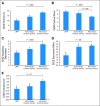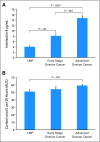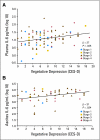Interleukin-6, cortisol, and depressive symptoms in ovarian cancer patients - PubMed (original) (raw)
. 2008 Oct 10;26(29):4820-7.
doi: 10.1200/JCO.2007.14.1978. Epub 2008 Sep 8.
Aliza Z Weinrib, Frank Penedo, Daniel Russell, Koen DeGeest, Erin S Costanzo, Patrick J Henderson, Sandra E Sephton, Nicolas Rohleder, Joseph A Lucci 3rd, Steven Cole, Anil K Sood, David M Lubaroff
Affiliations
- PMID: 18779606
- PMCID: PMC2653140
- DOI: 10.1200/JCO.2007.14.1978
Interleukin-6, cortisol, and depressive symptoms in ovarian cancer patients
Susan K Lutgendorf et al. J Clin Oncol. 2008.
Abstract
Purpose: Inflammatory processes have been implicated in the pathogenesis of both depression and cancer. Links between depressive symptoms, interleukin-6 (IL-6), and cortisol dysregulation have been demonstrated in cancer patients, but vegetative versus affective components of depression have been minimally examined. The objective of the current study was to examine associations between IL-6, diurnal cortisol rhythms, and facets of depression in epithelial ovarian cancer patients.
Patients and methods: Patients awaiting surgery for a pelvic mass suspected for ovarian cancer completed questionnaires, collected salivary samples for 3 days presurgery, and gave a presurgical blood sample. Ascites was obtained during surgery. IL-6 was measured by enzyme-linked immunosorbent assay and cortisol by a chemiluminescence immunoassay. The final sample included 112 invasive ovarian cancer patients (86 advanced stage, 26 early stage) and 25 patients with tumors of low malignant potential (LMP).
Results: Advanced-stage ovarian cancer patients demonstrated elevations in vegetative and affective depressive symptoms, plasma IL-6, and the cortisol area under the curve (AUC) compared with patients with LMP tumors (all P < .05). Among invasive ovarian cancer patients, greater vegetative depression was related to elevated IL-6 in plasma (P = .008) and ascites (P = .024), but affective depression was unrelated to IL-6. Elevations in total depression (P = .026) and vegetative depression (P = .005) were also related to higher evening cortisol levels. Plasma IL-6 was related to greater afternoon and evening cortisol and cortisol AUC (all P values < .005).
Conclusion: These results demonstrate significant relationships between IL-6, cortisol, and vegetative depression, and may have implications for treatment of depression in ovarian cancer patients.
Figures
Fig 1.
Age-adjusted means (and SE bars) for Center for Epidemiologic Studies-Depression Scale (CES-D) among advanced- and early-stage invasive ovarian cancer patients and patients with tumors of low malignant potential (LMP). (A) CES-D total, (B) positive mood subscale, (C) vegetative depression subscale, (D) depressive mood subscale, and (E) depressive interaction subscale. All significance levels are Bonferroni adjusted.
Fig 2.
Means and (SE bars) for (A) plasma interleukin-6 (IL-6) (pg/mL) and (B) cortisol area under the curve (AUC) in advanced- and early-stage invasive ovarian cancer patients and in patients with tumors of low malignant potential (LMP). All significance levels are Bonferroni adjusted.
Fig 3.
Vegetative depression and interleukin-6 (IL-6; pg/mL) in (A) peripheral blood (β = .27, P = .008) and (B) ascites (β = .31, P = .024) in invasive ovarian cancer patients. Stage 1 (circle), stage 2 (square), stage 3 (triangle), stage 4 (diamond). All analyses adjust for age and cancer stage. Regression line is representative of all stages of disease.
Similar articles
- Cortisol and inflammatory processes in ovarian cancer patients following primary treatment: relationships with depression, fatigue, and disability.
Schrepf A, Clevenger L, Christensen D, DeGeest K, Bender D, Ahmed A, Goodheart MJ, Dahmoush L, Penedo F, Lucci JA 3rd, Ganjei-Azar P, Mendez L, Markon K, Lubaroff DM, Thaker PH, Slavich GM, Sood AK, Lutgendorf SK. Schrepf A, et al. Brain Behav Immun. 2013 Mar;30 Suppl(0):S126-34. doi: 10.1016/j.bbi.2012.07.022. Epub 2012 Aug 5. Brain Behav Immun. 2013. PMID: 22884960 Free PMC article. - Diurnal cortisol and survival in epithelial ovarian cancer.
Schrepf A, Thaker PH, Goodheart MJ, Bender D, Slavich GM, Dahmoush L, Penedo F, DeGeest K, Mendez L, Lubaroff DM, Cole SW, Sood AK, Lutgendorf SK. Schrepf A, et al. Psychoneuroendocrinology. 2015 Mar;53:256-67. doi: 10.1016/j.psyneuen.2015.01.010. Epub 2015 Jan 20. Psychoneuroendocrinology. 2015. PMID: 25647344 Free PMC article. - The biology of hope: Inflammatory and neuroendocrine profiles in ovarian cancer patients.
Lutgendorf SK, Telles RM, Whitney B, Thaker PH, Slavich GM, Goodheart MJ, Penedo FJ, Noble AE, Cole SW, Sood AK, Corn BW. Lutgendorf SK, et al. Brain Behav Immun. 2024 Feb;116:362-369. doi: 10.1016/j.bbi.2023.12.014. Epub 2023 Dec 9. Brain Behav Immun. 2024. PMID: 38081436 Free PMC article. - Diurnal cortisol dysregulation, functional disability, and depression in women with ovarian cancer.
Weinrib AZ, Sephton SE, Degeest K, Penedo F, Bender D, Zimmerman B, Kirschbaum C, Sood AK, Lubaroff DM, Lutgendorf SK. Weinrib AZ, et al. Cancer. 2010 Sep 15;116(18):4410-9. doi: 10.1002/cncr.25299. Cancer. 2010. PMID: 20564155 Free PMC article. - Inflammatory markers and cortisol parameters across depressive subtypes in an older cohort.
Veltman EM, Lamers F, Comijs HC, Stek ML, van der Mast RC, Rhebergen D. Veltman EM, et al. J Affect Disord. 2018 Jul;234:54-58. doi: 10.1016/j.jad.2018.02.080. Epub 2018 Feb 27. J Affect Disord. 2018. PMID: 29522944 Review.
Cited by
- Associations of interleukin-6 with vegetative but not affective depressive symptoms in terminally ill cancer patients.
Inagaki M, Akechi T, Okuyama T, Sugawara Y, Kinoshita H, Shima Y, Terao K, Mitsunaga S, Ochiai A, Uchitomi Y. Inagaki M, et al. Support Care Cancer. 2013 Aug;21(8):2097-106. doi: 10.1007/s00520-013-1767-x. Epub 2013 Feb 28. Support Care Cancer. 2013. PMID: 23446881 - Inflammation and cancer-related fatigue: mechanisms, contributing factors, and treatment implications.
Bower JE, Lamkin DM. Bower JE, et al. Brain Behav Immun. 2013 Mar;30 Suppl(0):S48-57. doi: 10.1016/j.bbi.2012.06.011. Epub 2012 Jul 6. Brain Behav Immun. 2013. PMID: 22776268 Free PMC article. Review. - Blood pressure, salivary cortisol, and inflammatory cytokine outcomes in senior female cancer survivors enrolled in a tai chi chih randomized controlled trial.
Campo RA, Light KC, O'Connor K, Nakamura Y, Lipschitz D, LaStayo PC, Pappas LM, Boucher KM, Irwin MR, Hill HR, Martins TB, Agarwal N, Kinney AY. Campo RA, et al. J Cancer Surviv. 2015 Mar;9(1):115-25. doi: 10.1007/s11764-014-0395-x. Epub 2014 Aug 28. J Cancer Surviv. 2015. PMID: 25164513 Free PMC article. Clinical Trial. - Cancer, coping, and cognition: a model for the role of stress reactivity in cancer-related cognitive decline.
Andreotti C, Root JC, Ahles TA, McEwen BS, Compas BE. Andreotti C, et al. Psychooncology. 2015 Jun;24(6):617-23. doi: 10.1002/pon.3683. Epub 2014 Oct 6. Psychooncology. 2015. PMID: 25286084 Free PMC article. Review. - The role of brain-derived neurotrophic factor in comorbid depression: possible linkage with steroid hormones, cytokines, and nutrition.
Numakawa T, Richards M, Nakajima S, Adachi N, Furuta M, Odaka H, Kunugi H. Numakawa T, et al. Front Psychiatry. 2014 Sep 26;5:136. doi: 10.3389/fpsyt.2014.00136. eCollection 2014. Front Psychiatry. 2014. PMID: 25309465 Free PMC article. Review.
References
- Massie MJ: Prevalence of depression in patients with cancer. J Natl Cancer Inst Monogr 32:57-71, 2004 - PubMed
- Spoletini I, Gianni W, Repetto L, et al: Depression and cancer: An unexplored and unresolved emergent issue in elderly patients. Crit Rev Oncol Hematol 65:143-155, 2008 - PubMed
- American Cancer Society: Cancer Facts and Figures. Atlanta, GA, American Cancer Society, 2008
- Bodurka-Bevers D, Basen-Engquist K, Camark CL, et al: Depression, anxiety, and quality of life in patients with epithelial ovarian cancer. Gyn Oncol 78:302-308, 2000 - PubMed
- Norton TR, Manne SL, Rubin S, et al: Prevalence and predictors of psychological distress among women with ovarian cancer. J Clin Oncol 22:919-926, 2004 - PubMed
Publication types
MeSH terms
Substances
LinkOut - more resources
Full Text Sources
Other Literature Sources
Medical


